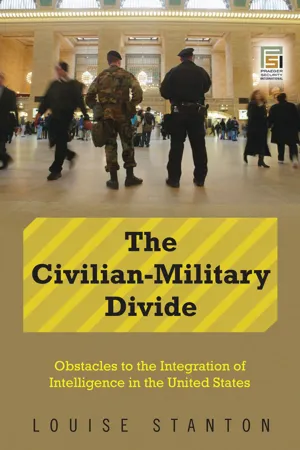
The Civilian-Military Divide
Obstacles to the Integration of Intelligence in the United States
- 288 pages
- English
- PDF
- Available on iOS & Android
The Civilian-Military Divide
Obstacles to the Integration of Intelligence in the United States
About this book
This book examines how U.S. domestic institutions stand up to global threats and whether intelligence sharing across military and civilian law enforcement barriers is legal. The U.S. Constitution is designed to distribute power in order to prevent its concentration, and in particular, it draws clear lines between the responsibilities of the military and those of civilian law enforcement. But the new global threat paradigm, requiring responses both abroad and at home, calls out for military and civilian intelligence gathering to work in tandem. The Civil-Military Divide: Obstacles to the Integration of Intelligence in the United States looks at historic and legal ramifications of such efforts. Louise Stanton's thought-provoking work sums up the current state of U.S. intelligence gathering at all levels of government. It then looks at the range of recommendations for overhauling our intelligence efforts in the context of the U.S. Constitution to assess what may or may not be constitutionally supportable. At issue are three long-established, often reaffirmed principles: the separation of powers, the federalist system that gives the U.S. government precedence over states, and the separation of the civilian and military sectors.
Frequently asked questions
- Essential is ideal for learners and professionals who enjoy exploring a wide range of subjects. Access the Essential Library with 800,000+ trusted titles and best-sellers across business, personal growth, and the humanities. Includes unlimited reading time and Standard Read Aloud voice.
- Complete: Perfect for advanced learners and researchers needing full, unrestricted access. Unlock 1.4M+ books across hundreds of subjects, including academic and specialized titles. The Complete Plan also includes advanced features like Premium Read Aloud and Research Assistant.
Please note we cannot support devices running on iOS 13 and Android 7 or earlier. Learn more about using the app.
Information
Table of contents
- Cover
- Contents
- Acknowledgments
- Abbreviations
- 1 The Introduction
- 2 The Security Environment
- 3 U.S. Law
- 4 The Hypothesis, Research Question, Methodology
- 5 Intelligence: The Domestic Arrangements of the United States
- 6 U.S. Military Doctrine on Counterinsurgency, Homeland Security, and Intelligence
- 7 State Fusion Centers
- 8 Planning
- 9 Implications and Conclusions
- Appendixes
- Notes
- Bibliography
- Index